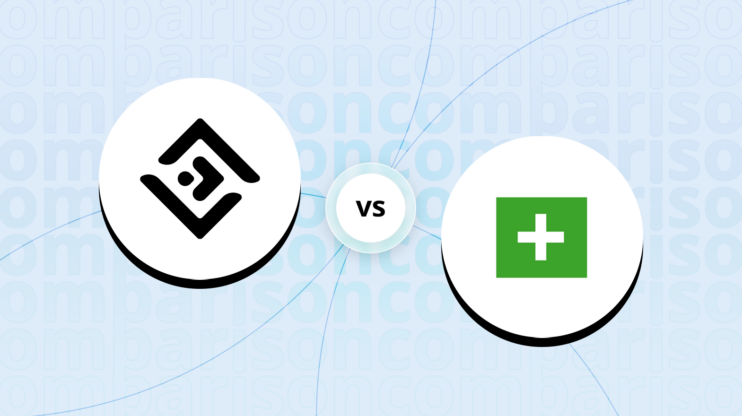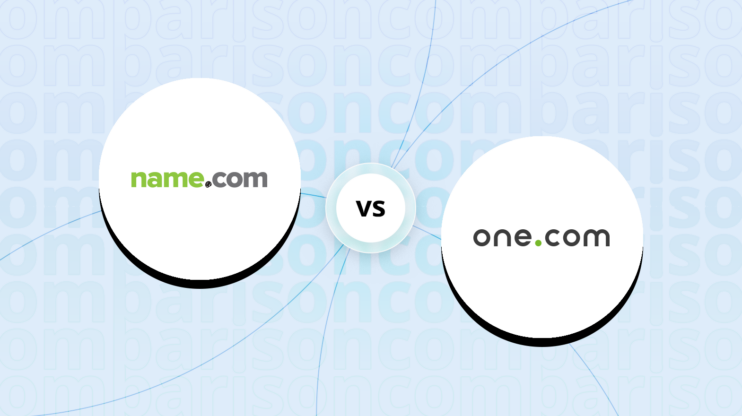Web.com vs Web Hosting Hub: Final verdict
Looking over Web.com vs. Web Hosting Hub, both providers offer solid hosting solutions but cater to slightly different needs and preferences.
-
Web Hosting Hub (Overall grade: 7.5)
is particularly noted for its speed and uptime, thanks to free SSD storage included with all plans, which significantly boosts website performance. The unlimited bandwidth ensures smooth operation even during high traffic, and the 90-day money-back guarantee provides a risk-free trial period. With features like free cPanel and website transfers, it’s easy for users to migrate their existing sites. The provider supports multiple websites and databases, making it an excellent choice for agencies and multimedia-heavy sites. However, it does come at a higher price point, which might not be the best option for budget-conscious users.
Web.com (Overall grade: 7.3)
offers reliable hosting with a 99.9% uptime guarantee and 24/7 support. It includes unmetered bandwidth and SSL security in its plans, and tools like a drag-and-drop website builder and automatic backups simplify site management. These features make Web.com a good option for small businesses and entrepreneurs. Nevertheless, actual uptime sometimes falls a bit short, and higher renewal rates with occasional downtime can be downsides. Still, the provider offers advanced features like PHP 8.0, OPcache, and MySQL 8 for faster speed, making it a compelling option for those seeking high performance and security.
 Overall grade:7.3 |
 Overall grade:7.5 |
|
|---|---|---|
| Uptime and Availability | 8.0 | 9.2 |
| Hosting Performance | 6.6 | 5.0 |
| Hosting Security | 8.2 | 8.0 |
| Price | 8.0 | 7.6 |
| Hosting Features | 4.8 | 6.9 |
| Ease Of Setup | 7.6 | 8.8 |
| User Management | 7.3 | 7.1 |
| Customer Support | 8.2 | 7.8 |
| User feedback | 4/5 | 4.5/5 |
Hosting types offered
Both platforms provide a variety of hosting types, each designed to meet the different needs of users.
 |
 |
|
|---|---|---|
| Shared hosting | ||
| Cloud hosting | ||
| WordPress hosting | ||
| Ecommerce hosting | ||
| VPS hosting | ||
| Dedicated hosting |
Although both offer a variety of hosting plans tailored to different needs, in
certain cases, one platform may prove to be more suitable.
Detailed comparison
Uptime and availability
Evaluates the average uptime statistics, uptime guarantee and overall availability of the hosting
provider
Score Components:
- Uptime percentage (30%): evaluates the uptime statistics in given period of time
- Uptime guarantee (20%): Assesses if the platform offers an uptime guarantee and
whether the actual uptime matches the promised guarantee. - General performance (25%): Evaluates how fast is the average response time and overall
it’s stability. - Responsiveness (10%): Adaptability to different devices and screen sizes.
- Availability (25%): Reflects the total downtime and number of outages.
 8.0
8.0
 9.2
9.2
Winner Web Hosting Hub: Offers unparalleled speed and uptime with competitive pricing.

Web Hosting Hub stands out due to its speed and uptime excellence, supported by free SSD storage that significantly boosts performance. All plans come with unlimited bandwidth, ensuring that websites run smoothly even with high traffic. Offering a 90-day money-back guarantee, it allows users to try their service risk-free. Additionally, free cPanel and website transfers facilitate easy migration without downtime.

Web.com, while reliable with a 99.9% uptime guarantee and 24/7 support, has actual uptime slightly below its promise. Unmetered bandwidth and SSL security are standard, and tools like the drag-and-drop website builder and automatic backups make site management easier. However, higher renewal rates and occasional downtime can make Web.com less attractive compared to its competitor.
Which one has better hosting performance?
Score Components:
- Hosting speed (30%): This includes SSD quality, Load times, PageSpeed score ranges,
additional information on website speed, built-in plugins for performance enhancement, available caching
methods, and CPU/RAM options - CDN (20%): Considers whether CDN is available or not, whether it’s free or paid, and
the quality of the CDN service - Available data centers (30%): Evaluates the number of data centers and their locations
globally. - Scalibility (20%): Looks at whether elastic scaling is available, the process required
to scale (manual upgrade vs. automatic scaling), the presence of dedicated servers, and the costs
associated with scaling.
 6.6
6.6
 5.0
5.0
🏆 Winner
Web.com: High-performance hosting designed for small businesses and entrepreneurs.
When comparing the general performance of Web.com and Web Hosting Hub, Web.com takes the lead due to its faster hosting speeds and advanced features. Web.com boasts server response times up to 70% faster, upgraded to PHP 8.0, OPcache, and MySQL 8, to ensure swift content display and secure performance. On the other hand, Web Hosting Hub provides different plans with varying performance and speed enhancements, offering free SSD storage and unlimited bandwidth across all its plans. Both providers offer SSL security, but Web.com’s optimized storage system and quicker navigation in WP-Admin give it an edge.
Website Speed
Web.com excels in website speed, featuring server response times up to 70% faster than rivals. With enhancements like PHP 8.0 and OPcache, it ensures content-rich websites load quickly. The Speed Index measurements against top WordPress hosts showcase its capability. In contrast, Web Hosting Hub’s best plans, like Dynamo, offer 4X standard speed with free SSD, but they don’t match the immediate speed benefits Web.com provides.
Scalability
Web.com offers scalable solutions for customers exceeding the shared architecture, supporting over 99.5% of bandwidth demands. Upgrading appears seamless, making it efficient for growing businesses. The specifics of dedicated server costs aren’t disclosed. Conversely, Web Hosting Hub provides a structured scaling through tiered plans but lacks clarity on elastic scaling features, and detailed dedicated server costs remain unspecified.
Which one has better security features?
and regulatory requirements
Score Components:
- Technical security measures (40%): This includes encryption, firewalls, DDoS
protection, secure configurations, server monitoring, access control and availability of security addons
(e.g Sitelock security). - Operational security measures (30%): Encompasses data privacy, backups and data
redundancy. - Compliance and certifications (20%): Adherence to legal and regulatory requirements
(e.g., GDPR, HIPAA) and possession of certifications (e.g., ISO 27001, SOC 2). - Business and reliability (10%): Factors in the provider’s reputation, uptime
guarantees, and customer support.
 8.2
8.2
 8.0
8.0
🏆 Winner Web.com: A hosting provider with robust security features and high reliability.
Both Web.com and Web Hosting Hub, have notable differences in their approaches to technical and operational security, as well as in their compliance with regulations.
Technical security measures:
Web.com offers advanced SSL certificate options ranging from Essential to Extended Validation SSL, coupled with the ability to accommodate up to 99 domains with UCC. It operates on PHP 8.0, ensuring faster performance and greater security. Additionally, specialists can benefit from SiteLock solutions like malware scanning and automatic removal. Web Hosting Hub, on the other hand, includes a free SSL and supports third-party SSLs. PHP 7 is the standard here, delivering a good balance of security and performance. Security measures such as suPHP encryption and Advanced Policy Firewall offer ample protection for hosted sites. Overall, Web.com stands out with comprehensive SSL options and more recent PHP version support.
Operational security measures:
Web.com ensures continuous site operability with a 99.9% uptime guarantee and unmetered bandwidth. SiteLock adds features like malware scanning, auto-removal, and a CDN. CodeGuard enhances security with automated backups and Server Side Encryption. Web Hosting Hub provides Advanced Policy Firewall, IP Blocking, and password-protected directories to secure website operations. Automatic backups are available for an additional fee, and SSH access ensures secure command-line management. Web Hosting Hub also offers 24/7 support, promising quick resolutions. While both providers emphasize strong operational security, Web.com offers more comprehensive solutions tailored for various website needs.
Compliance and certifications:
Web.com adheres to GDPR and PCI compliance, ensuring stringent data protection and transaction security. Web Hosting Hub’s documentation does not explicitly address GDPR/PCI compliance. However, it emphasizes data security and privacy, suggesting a commitment to these regulations. Web.com’s clear compliance with both GDPR and PCI offers an added layer of assurance for businesses seeking these certifications.
 |
 |
|
|---|---|---|
SSL certificate |
Multiple Types |
Free SSL |
Additional security features |
SiteLock, CodeGuard |
Advanced Policy Firewall |
PHP versions |
PHP 8.0 |
PHP 7 |
GDPR compliance |
Yes |
Not specified |
HIPAA compliance |
Not specified |
Not specified |
PCI compliance |
Yes |
Not specified |
Hosting features
Score Components:
- Domains (20%): Assesses the availability of a free domain, domain purchase options, and
pricing - Email (15%): Considers if the provider offers full email hosting, or is reselling
third-party service, and if the email is only transactional or not - Website builder (15%): Checks if website builder is available, and it’s user
friendliness and overall the level of customization allowed. - Staging environment (20%): Determines if a staging environment is available, allowing
for testing changes before going live. - FTP & SFTP accounts (10%): Evaluates if and how easily users can access FTP and
SFTP accounts - Git and SSH access (20%): Assess whether Git is integrated into the hosting service and
if SSH access is provided
 4.8
4.8
 6.9
6.9
🏆 Winner
Web Hosting Hub: A comprehensive hosting solution with advanced features and robust support.
Web.com and Web Hosting Hub both offer a variety of features that cater to different hosting needs. Web.com provides a drag-and-drop website builder that simplifies the process of creating websites, making it user-friendly for beginners. Additionally, they include a free domain and SSL certificate for the first year, which can be appealing for small businesses or personal sites. Their plans also come with 24/7 customer support and managed WordPress hosting, which are useful for users who need ongoing assistance and automatic updates. However, the availability of SFTP/SSH with Web.com is unclear, potentially limiting its suitability for developers requiring secure server access.
Web Hosting Hub stands out with unlimited websites on their higher-tier plans, free SSDs for faster performance, and SSH access across all plans, making it suitable for more technical users. They offer a free domain and free SSL, and include unlimited disk space and bandwidth, which can be crucial for larger websites or businesses expecting growth. The inclusion of BoldGrid as a free website builder provides flexibility for easy customization. Moreover, their 90-day money-back guarantee and 24/7 support enhance the reliability and trustworthiness of their services. While slightly pricier, the comprehensive features and advanced support options make Web Hosting Hub a compelling choice for many users.
 |
 |
|
|---|---|---|
Free Domain |
Yes, for the first year |
Yes |
Free SSL |
Yes, for the first year |
Yes |
Email Hosting |
Yes |
Yes, unlimited |
Website Builder |
Yes, drag-and-drop |
Yes, BoldGrid |
Staging Environment |
Not mentioned |
Yes, with cPanel |
FTP & SFTP Accounts |
Yes |
Likely (FTP), Yes (SFTP/SSH) |
Git and SSH Access |
Not explicitly mentioned |
Yes (SSH) |
Free Backup |
Not mentioned |
No (optional for $1/month) |
Money-Back Guarantee |
Not mentioned |
Yes, 90 days |
a location.
As a result in rare cases the features mentioned here can differ from the ones you see on their websites.
Both providers support a range of users from beginners to experts with user-friendly website builders and WordPress staging areas. However, in terms of developer tools, both Web.com and Web Hosting Hub offer robust options including SSH access, support for multiple programming languages, and Git for version control, thus appealing to developers looking for advanced capabilities.
Email Services:
Web.com offers business email hosting included in their plans, which is useful for creating professional email addresses tied to your domain. Web Hosting Hub provides unlimited email accounts across all plans, ensuring robust email hosting capabilities. They support secure POP3/IMAP email, email forwarding, and SPAM protection. Both providers do not explicitly mention reselling third-party email services like Google Workspace or Zoho, focusing instead on ensuring necessary email functionalities are included in their hosting services.
Price
Score Components:
- Plan value (40%): What each pricing tier offers.
- Transparency and clarity (30%): Clearness of pricing structures.
- Flexibility of plans (20%): Range of options to suit different budgets.
- Hidden costs (10%): Additional expenses not included in the plan.
 8.0
8.0
 7.6
7.6
🏆 Winner Web.com:Affordable plans packed with essential features.
Evaluating the pricing of plans among various hosting providers can be complex due to their differing pricing and renewal strategies. Additionally, certain plans require annual commitments, which adds to the difficulty of making comparisons. The prices listed are based on monthly commitments; plans requiring annual commitments are indicated. Additionally, although some providers offer identical plans for WordPress and shared hosting, we have created separate tables for each to enhance clarity.
Web.com and Web Hosting Hub offer a variety of hosting plans catering to different needs. Web.com’s shared and WordPress hosting plans have lower initial prices, though they rise significantly upon renewal. Web Hosting Hub offers comprehensive features in their Spark, Nitro, and Dynamo plans, but at a higher price point compared to Web.com’s initial offers. Web.com includes essentials like a drag-and-drop website builder and business email in all their plans, while Web Hosting Hub offers unlimited storage and bandwidth in their beginner plan, with advanced features like 1-Click applications and enhanced performance in higher-tier plans.
 |
 |
|---|---|
|
Basic Plan$9.99
1 Website, 10GB Storage, Unmetered Bandwidth, Free Domain, Business Email Value for price:7.8
|
Spark Plan$11.99
2 Websites, Unlimited Storage/Bandwidth, Free Domain, Unlimited Email Accounts, SSD Speed Value for price:7.6
|
|
Plus Plan$13.99
5 Websites, 20GB Storage, Unmetered Bandwidth, Free Domain, Business Email, SSL Certificate Value for price:8.2
|
Nitro Plan$15.49
Unlimited Websites, Unlimited Storage/Bandwidth, Free Domain, Unlimited Email Accounts, SSD Speed, Enhanced Performance Value for price:7.9
|
|
Premium Plan$16.99
10 Websites, 40GB Storage, Unmetered Bandwidth, Free Domain, Business Email, SSL Certificate Value for price:8.5
|
Dynamo Plan$20.49
Unlimited Websites, Unlimited Storage/Bandwidth, Free Domain, Unlimited Email Accounts, SSD Speed, Highest Performance Value for price:8.1
|
 |
 |
|---|---|
|
Basic Plan$9.99
1 Website, 10GB Storage, Unmetered Bandwidth, Free Domain, Drag-and-drop Website Builder, Business Email Value for price:7.8
|
Spark Plan$11.99
2 Websites, Unlimited Storage/Bandwidth, Free Domain, Unlimited Email Accounts, SSD Speed, Free Website Builder Value for price:7.6
|
|
Plus Plan$13.99
5 Websites, 20GB Storage, Unmetered Bandwidth, Free Domain, Drag-and-drop Website Builder, Business Email, SSL Certificate Value for price:8.2
|
Nitro Plan$15.49
Unlimited Websites, Unlimited Storage/Bandwidth, Free Domain, Unlimited Email Accounts, SSD Speed, Enhanced Performance, Free Website Builder Value for price:7.9
|
|
Premium Plan$16.99
10 Websites, 40GB Storage, Unmetered Bandwidth, Free Domain, Drag-and-drop Website Builder, Business Email, SSL Certificate Value for price:8.5
|
Dynamo Plan$20.49
Unlimited Websites, Unlimited Storage/Bandwidth, Free Domain, Unlimited Email Accounts, SSD Speed, Highest Performance, Free Website Builder Value for price:8.1
|
 |
 |
|---|---|
|
Basic Plan$9.99
N/A
|
Spark Plan$11.99
2 Websites, Unlimited Storage/Bandwidth, Free Domain, Unlimited Email Accounts, SSD Speed Value for price:7.6
|
|
Plus Plan$13.99
N/A
|
Nitro Plan$15.49
Unlimited Websites, Unlimited Storage/Bandwidth, Free Domain, Unlimited Email Accounts, SSD Speed, Enhanced Performance Value for price:7.9
|
|
Premium Plan$16.99
N/A
|
Dynamo Plan$20.49
Unlimited Websites, Unlimited Storage/Bandwidth, Free Domain, Unlimited Email Accounts, SSD Speed, Highest Performance Value for price:8.1
|
Enterprise plans
Both Web.com and Web Hosting Hub provide robust options for businesses, but Web Hosting Hub’s offerings are better suited for enterprises due to their unlimited storage, bandwidth, and websites capabilities. The Nitro and Dynamo Plans from Web Hosting Hub also deliver higher performance and enhanced features critical for scaling businesses. Meanwhile, Web.com’s Plus and Premium Plans, while offering substantial resources, don’t quite match the scalability and advanced performance options provided by Web Hosting Hub.
Web.com vs Web Hosting Hub: Ease of setup
platform.
Score Components:
- Site migration (25%): Assesses whether the provider offers tools for site migration,
either automated or manual, and whether these services are free or require a fee. - Admin panel usability (35%): Evaluates the type of admin panel provided, such as the
standard cPanel or a custom solution, focusing on its accessibility and user-friendliness for both
technical and non-technical users. - Setup features (20%): Examines the availability and ease of use of various setup
features, including FTP accounts, file managers, email account setup, PHPMyAdmin, and easy CDN
configuration. - Help center quality (20%): Measures the quality and accessibility of the provider’s
help center resources, including articles and tutorials.
 7.6
7.6
 8.8
8.8
🏆 Winner
Web Hosting Hub: Offers seamless setup with intuitive tools and extensive support features.
Web.com provides a user-friendly hosting control panel that centralizes various administrative tasks such as domain management, email setup, and performance monitoring. This interface is straightforward, accommodating both technical and non-technical users efficiently. However, it’s relatively basic compared to other solutions on the market. Web Hosting Hub, on the other hand, uses the popular cPanel, renowned for its accessibility and comprehensive feature set. It includes advanced tools that simplify web management tasks, making it suitable for users at any skill level. The addition of free SSDs and SSL boosts the overall user experience by offering faster performance and enhanced security.
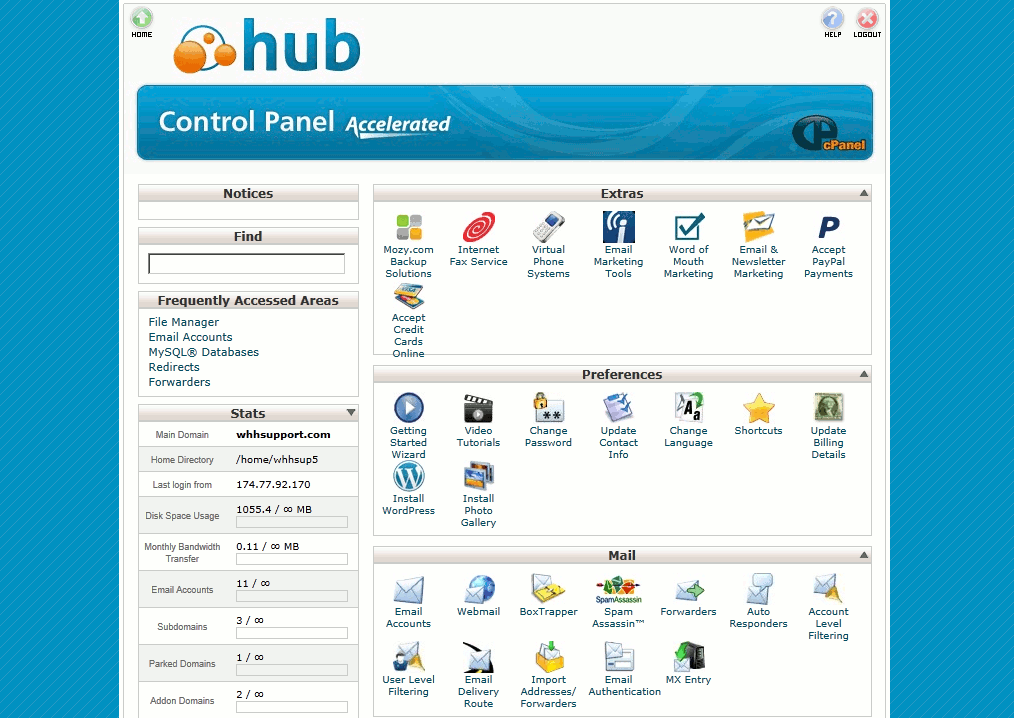
Web.com, on the other hand, offers a dual interface that combines a custom dashboard with full cPanel access, catering to both beginners and technically advanced users. The platform includes a comprehensive help center filled with a wide variety of guides and tutorials, aimed at assisting users in managing and optimizing their websites effectively.
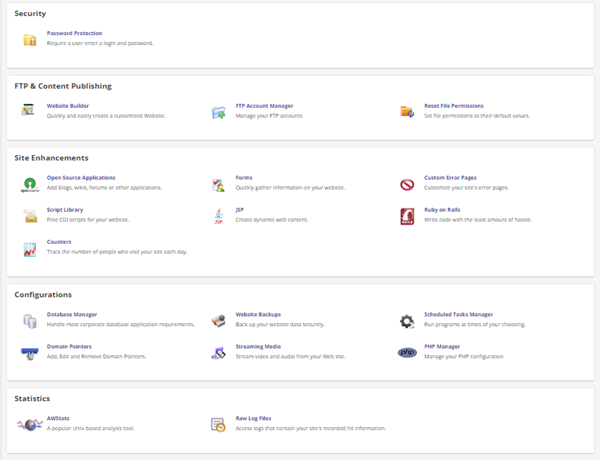
Migration tools are a critical aspect of hosting services. Web.com offers basic migration assistance but charges a fee for more comprehensive services. In contrast, Web Hosting Hub provides automated migration tools at no extra cost, simplifying the transfer process for new users. This feature is particularly appealing for those looking to switch hosting providers without incurring additional expenses.
The quality and accessibility of help center resources are crucial for user support. Web.com has a broad range of resources, including 24/7 support via live chat, email, and phone, alongside a well-developed knowledge base. Web Hosting Hub complements its user-friendly cPanel with an extensive help center, offering tutorials on numerous topics alongside 24/7/365 live chat and phone support.
User management
accessibility.
Score Components:
- Role customization (40%): Flexibility in creating and defining user roles and
permissions. - Ease of management (30%): User interface and tools for managing users.
- Access control (20%): Effectiveness of access control measures for different user
levels. - Scalability (10%): Ability to manage a growing number of users efficiently.
 7.3
7.3
 7.1
7.1
🏆 Winner
Web.com: A comprehensive user management system with detailed account control.
Web.com and Web Hosting Hub both provide user management features, but the extent and specificity of these features vary. Web.com offers a more detailed system for managing user roles and permissions, with clear distinctions between administrative and technical roles. Users can be added or edited with specified roles, and roles can control everything from billing information to product management. In contrast, Web Hosting Hub offers basic security and permission features, such as email management, FTP account creation, and directory password protection, but it does not specify distinct user roles like Web.com. This makes Web.com more flexible and precise in its user management capabilities.
For managing users, Web.com uses a distinct Account Manager interface, which allows admin users to see all contacts and their access levels in one place. Adding or editing users is streamlined through this interface, allowing for easy role assignment and billing management. Web Hosting Hub relies on cPanel, offering tools to manage emails, FTP accounts, and security settings. While cPanel is a well-known interface that many users find familiar, it lacks the role-specific granularity seen in Web.com, focusing more on technical task management than hierarchical user permissions.
When assessing access control measures, Web.com excels with specific role definitions and an intuitive Account Manager for managing users across potentially multiple accounts. It allows detailed control over user permissions and easy differentiation between admin and technical roles. Web Hosting Hub, offering SSH access, password protection, and IP blocking, provides good security measures but may fall short in efficiently managing a growing number of users with varied roles. Web.com’s structured approach to roles and permissions supports scaling up user management more effectively.
Web.com User Roles Table:
| Role | Description | Access highlights |
|---|---|---|
| Administrative | Controls most aspects of the account. Ideal for users who need to manage contacts, products, and billing information. | Can add/edit/delete contacts, manage products/services, and edit billing info. |
| Technical | Has limited permissions focused on technical tasks. Suitable for users who only need to manage products and services. | Can manage products and services but cannot edit billing or administrative details. |
Customer support
hosting provider.
Score Components:
- Support communication channels (30%): Measures the variety of customer support types
provided (live chat, chatbot, email, phone, etc.) - Availability (20%): Assesses the availability hours for each channel, including 24/7
support options. - Technical support quality (30%): Assesses whether the provider offers comprehensive
technical support, including hardware upgrades (e.g., HDD to SSD), software installations, and web
server configuration changes. - Enterprise support (20%): Checks if there are dedicated or priority support services
for enterprise-level customers.
 8.2
8.2
 7.8
7.8
🏆 Winner
Web.com: Reliable and accessible customer support suitable for diverse customer needs.
 |
 |
|
|---|---|---|
Phone support |
||
Live chat support |
||
Chatbot |
||
Email/ticket support |
||
Enterprise support (dedicated agent, priority support) |
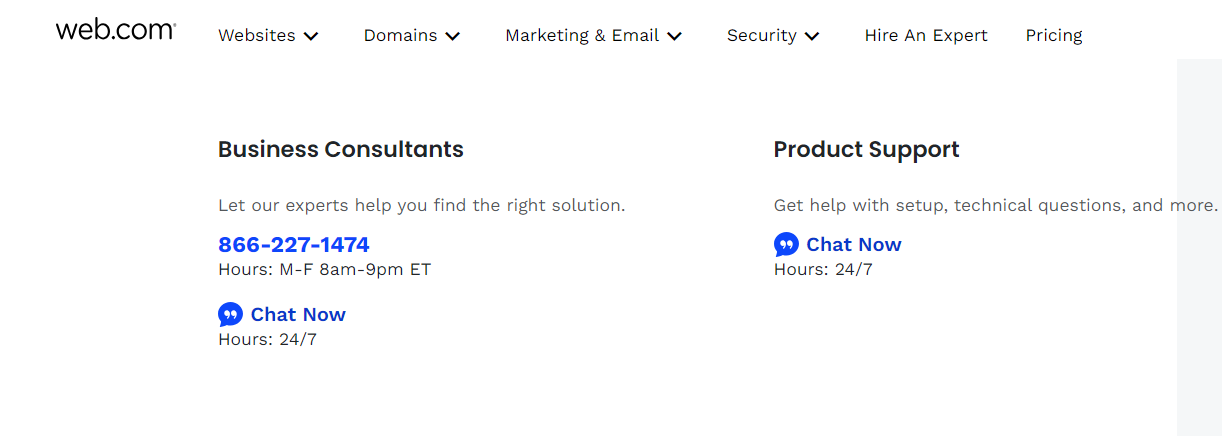
Web.com and Web Hosting Hub both offer comprehensive customer support, but Web.com stands out with its wider range of 24/7 support channels including phone, email, live chat, and a ticket system. Their technical support is available around the clock, complemented by a well-structured online help center. Business consultants are accessible during extended hours, adding an extra layer of assistance for business clients.

Web Hosting Hub, on the other hand, provides 24/7 general support via phone, email, and chat, with the addition of Skype calls for more specialized inquiries. They also cover sales and billing departments separately for more focused assistance. While both providers ensure constant availability, Web.com’s broader range of support options and their specific support channels for cancellation inquiries give them an edge over Web Hosting Hub.
Web.com vs Web Hosting Hub: User feedback
Overall, users appreciate the hosting provider for its comprehensive service that includes domain purchasing, website hosting, and development, making it a convenient one-stop solution. However, there are concerns about limitations on hosting unlimited domains, which can be a significant drawback for users managing numerous websites. Additionally, the cost of individual website software is considered prohibitive by some, especially for those who already have lifetime licenses for third-party software. Despite these issues, the service is generally seen as satisfactory.
Overall, users appreciate the ease of use, affordability, and extensive features offered by this hosting provider. Many reviews praise the customer support for being responsive and knowledgeable, contributing to a generally positive experience. However, some users have noted the interface can be complex and occasionally overwhelming, and there are mixed feelings about the pricing for additional services like SSL. Despite minor inconveniences such as periodic connectivity issues and maintenance times, the hosting provider is highly recommended for its value and efficient support.
Web.com vs Web Hosting Hub: FAQ
Are both platforms suitable for beginners?
Both Web.com and Web Hosting Hub are suitable for beginners, offering user-friendly tools and support. Web.com features a drag-and-drop website builder, simplifying the website creation process. Web Hosting Hub provides free cPanel and website transfers, facilitating easy setup and migration for new users. Both platforms also offer 24/7 customer support to assist beginners with any issues.
Which platform offers better customer support?
Web.com offers a wider range of 24/7 support channels, including phone, email, live chat, and a ticket system, complemented by a well-structured online help center. Web Hosting Hub provides 24/7 support via phone, email, and chat, and includes Skype call support. While both providers ensure constant availability, Web.com’s broader range of support options and specific support channels give it an edge.
Which hosting service offers more scalability options for growing websites?
Web.com offers scalable solutions that efficiently support over 99.5% of bandwidth demands, with seamless upgrades for growing businesses. Web Hosting Hub provides structured scaling through tiered plans but lacks clarity on elastic scaling features. Web.com’s robust and flexible scaling options make it more suitable for growing websites.
What are the differences in the control panels offered by each hosting service?
Web.com offers a user-friendly hosting control panel that centralizes administrative tasks such as domain management, email setup, and performance monitoring, making it suitable for both technical and non-technical users. Web Hosting Hub uses cPanel, known for its accessibility and comprehensive feature set, which simplifies web management tasks for users at any skill level. Both panels enhance user experience, but cPanel is more advanced and widely recognized.
How do the providers handle email hosting and what features are included?
Web.com offers business email hosting included in their plans, useful for creating professional email addresses tied to your domain. Web Hosting Hub provides unlimited email accounts across all plans, supporting secure POP3/IMAP email, email forwarding, and SPAM protection. Both providers focus on ensuring necessary email functionalities but do not explicitly mention reselling third-party email services.
The making of this blog
We followed a clear, step-by-step process to write and research this article.










